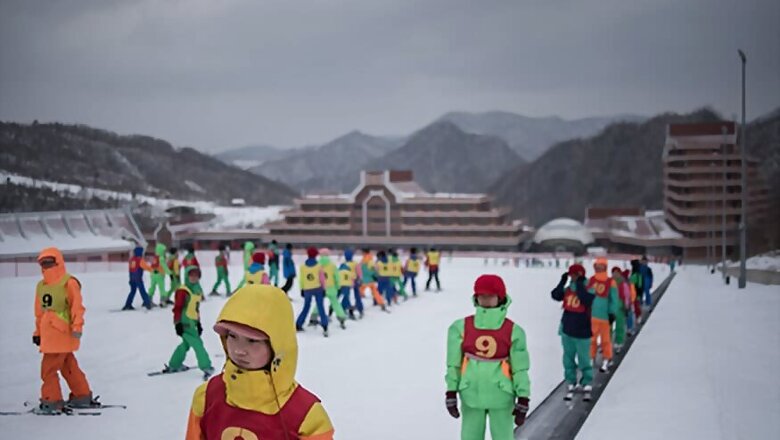
views
Outside a large stone tablet acclaims "the work of Dear Leader Kim Jong-Un who devoted hard work and heart and soul to make our people the happiest and most civilised people".
On the ski fields of Mount Taehwa, groomed pistes snake down wooded hillsides to a luxurious hotel and a giant screen showing a North Korean army choir. But the runs are empty.
Work began on Masikryong ski resort, the only one in the North and the brainchild of Supreme Leader Kim Jong-Un, after Pyeongchang in the neighbouring South was awarded the 2018 winter Olympics.
The impoverished, nuclear-armed nation has ramshackle infrastructure and around 40 percent of its people are undernourished, according to the Global Hunger Index.
But the luxurious resort boasts a wood-panelled reception and statues of winter sports athletes.
Outside a large stone tablet acclaims "the work of Dear Leader Kim Jong-Un who devoted hard work and heart and soul to make our people the happiest and most civilised people".
At a visitor centre packed with pictures of Kim - including one of him using a chairlift, although without skis - guides credit him with giving on-the-spot guidance no fewer than 144 times over the course of construction.
The resort is a three-hour drive from Pyongyang, down a potholed concrete road that passes through unlit tunnels and which civilian work crews clear of snow and ice by hand after fresh falls.
The warm comforts inside are a world away from the scenes outside the entrance checkpoint, where peasant farmers drag sleds loaded with firewood across frozen lakes, and ox-drawn carts are used for transport.
And - aside from the nursery slopes - it is deserted.
Happy lives
A second-hand Doppelmayr bubble lift, the ski boxes still stencilled with 'Ischgl', its original Austrian home, takes visitors to the top of Mt Taehwa, where a handful of curious Westerners enjoy the thrill of having almost an entire resort to themselves.
With a 700-metre vertical drop, the skiing compares favourably to other destinations in neighbouring China or South Korea.
At one point on a weekend afternoon in peak season, Swede Patrik Hultberg was the only skier on the slopes, he said. "That's really cool. I wish I could experience it more, hitting new pistes and there's nobody there."
Norwegian software developer Lars Eidnes has previously snowboarded in Iran and Kyrgyzstan. "If you want to escalate from there, then you come to DPRK," he said.
Day passes for foreigners cost almost $100, while for citizens of the Democratic People's Republic of Korea - around 100 of whom were on the single nursery slope - they are priced at the equivalent of about $30 at free-market rates.
By some estimates that approaches an ordinary worker's monthly salary. But most will go on group trips organised by their work unit, school or organisation, at zero or minimal cost.
After trying skiing for the first time, ship's captain Kwak Jong-Song said he found it "refreshing".
"I would like to thank our Supreme Leader Kim Jong-Un who is giving his whole devotion to our people's happy lives," he said.
Ordinary North Koreans normally only ever express officially-sanctioned views when speaking to foreigners.
White elephant?
Resort executives say it sees 70,000 visitors a year. Such figures are hard to square with the uncrowded vistas, but hotel director An Song-Ryol insists it is profitable.
"We do not mind the cost if it is for the improvement of the welfare of our people," he said. "We do not calculate."
Pyongyang has a "byungjin" policy of "simultaneous development", meaning pursuing both GDP growth and nuclear weapons at the same time, even though it is subject to multiple sets of UN sanctions over its atomic and missile programmes - among them a ban on luxuries, including snowmobiles and "recreational sports equipment".
At a parade this month for the 105th birth anniversary of founder Kim Il-Sung it displayed an arsenal of devices, including a suspected new intercontinental ballistic missile, as well as floats showing mock-ups of prestige property projects.
Masikryong was part of a regional development plan and driven by authorities' view that a prosperous country should have a ski resort, said Nick Bonner, director of specialist North Korea travel agency Koryo Tours, which offers it among its destinations. "So they built it."
"It's not busy, it's never been busy," he told AFP. "But it's not quite a white elephant either. It's going to take time."
But Andrei Lankov, director of website NK News and professor at Kookmin University in Seoul, said Pyongyang's tourism expectations have been "absolutely unfounded" and "nearly comical".
Kim Jong-Un went to school in Switzerland, he pointed out. "He just decided to emulate what he saw there," he said. "He saw wonderful mountains in Korea, which are indeed beautiful, and he said why not make our country into a tourist destination like Switzerland so we can make a lot of money like Switzerland does."
The incongruity of the situation is not lost on some Masikryong visitors.
Norwegian Eidnes, 29, said he had been treated "like a king" at Masikryong.
"It's very opulent, things are very nice," he added. "That's a sharp contrast to normal life for everyone. It's been on our minds."

















Comments
0 comment